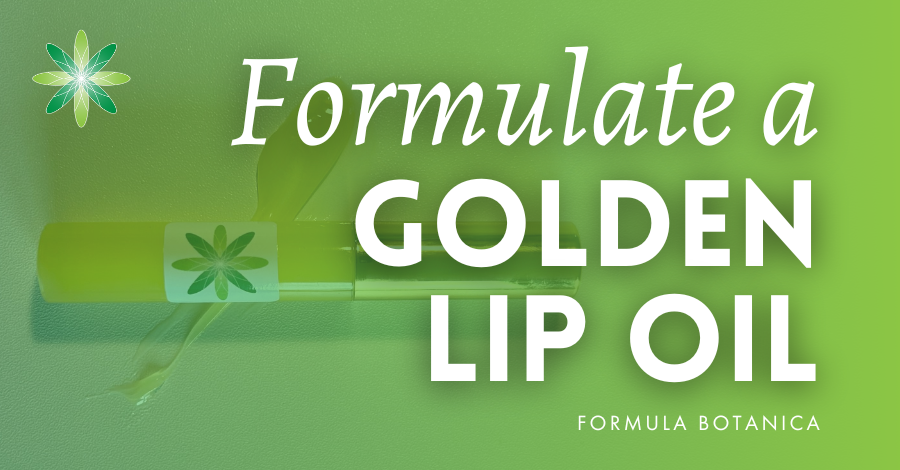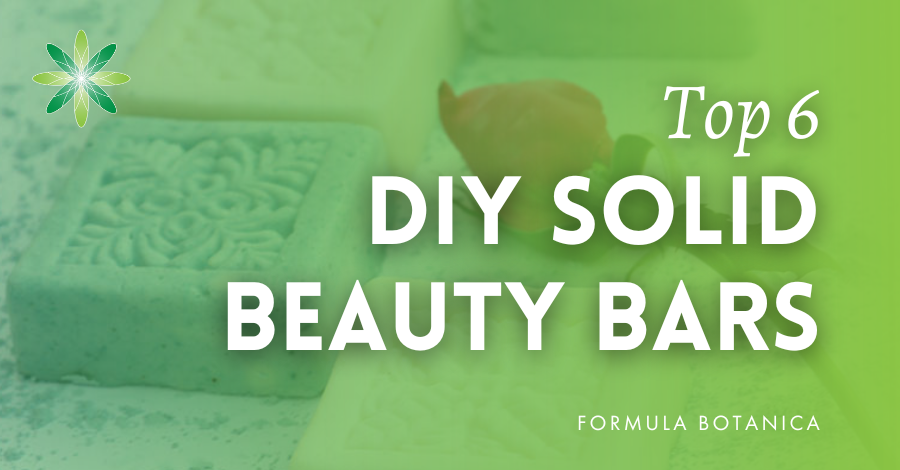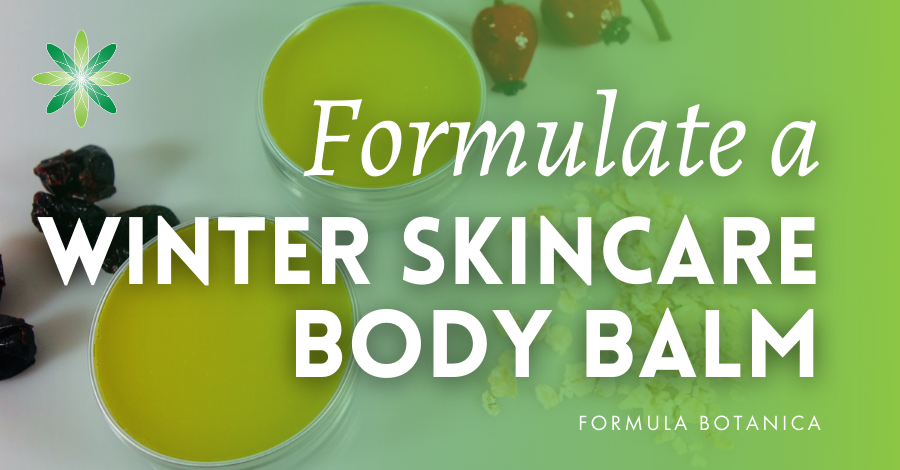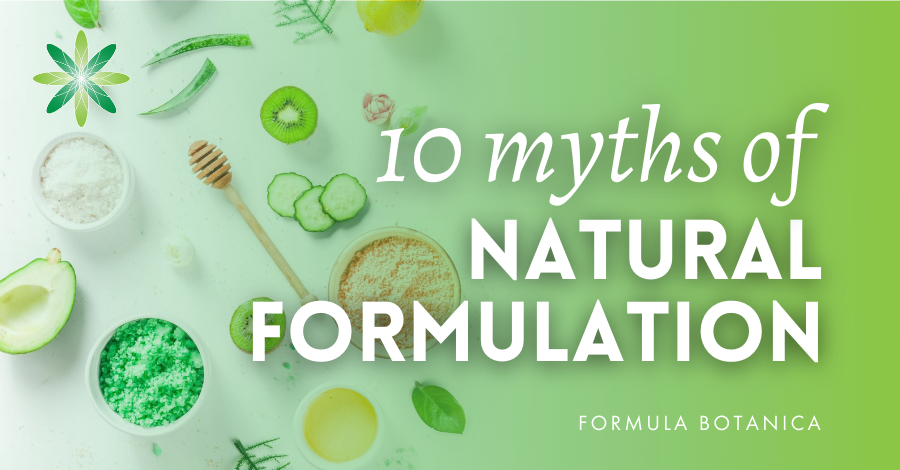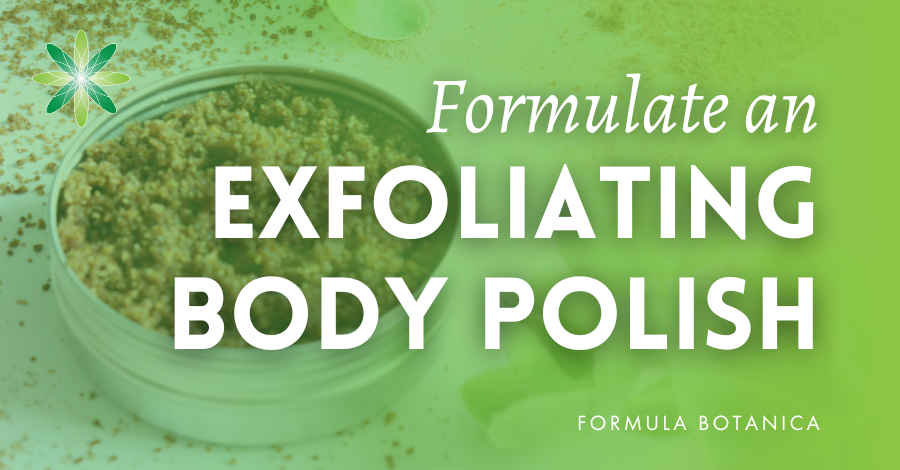Lip serum, balm, and oil: how are they different?
You might be wondering what sets lip oil, lip serum, and lip balm apart. In the beauty world, product descriptions often overlap or vary, making it sometimes tricky to understand their unique qualities. Here’s a breakdown of each:Lip serum
A lip serum is typically a lightweight, targeted treatment that can be formulated as an anhydrous (oil-based), water-based, or emulsion-based product. It’s packed with high-performance plant extracts and active ingredients, designed to deeply nourish, hydrate, and target specific lip concerns. Want to learn more about the different types of serum formulations? Check out our post on the 5 types of organic facial serum formulations for more insights. You can also learn how to make a natural lip serum below:How to formulate an indulgent lip serum
Lip balm
Lip balms are typically hot-processed formulations that combine waxes and harder butters to create a solid, smooth texture. They can be made in stick form, like a lipstick, or poured into a small pot for finger or spatula application. The key to a great lip balm lies in the perfect balance of waxes, butters, and oils, which determine its firmness and consistency. If want to make your own lip balm, here are a few formulations for you to try (I even included a lip scrub in there, to keep your lips soft and exfoliated!)How to formulate a berry-tinted lip balm How to make a whipped lip scrub How to make an Amazonian lip balmIf you’d like to learn how to make natural lipsticks, why not check out our membership site, the Lab at Formula Botanica? With over 50 bite-sized mini courses, we teach you how to make the latest in formulation, including lipsticks.
Lip oil
A lip oil is a lightweight, nourishing product designed to hydrate and soften the lips while providing a glossy finish. Unlike traditional lip balms or glosses, lip oils are typically made with a blend of natural oils, which penetrate the skin to provide deep moisture without feeling heavy or sticky. Lip oils are often infused with beneficial plant-based oils like jojoba, almond, or argan oil, which are rich in vitamins and fatty acids to help repair and protect the delicate skin of the lips. Some formulas also include a hint of color or a subtle tint, offering the perfect balance of skincare and makeup.Why make this golden lip oil
Our golden lip oil formula is simple yet effective, made with just five main oils and one wax, making it quick and easy to create at home. It’s the perfect balance—thicker than a traditional oil but lighter than a balm—providing hydration without feeling heavy. You can even customise this formula by adding active ingredients like oil-soluble hyaluronic acid, turning it into a nourishing lip serum. The skin on our lips is incredibly delicate, with only 3-5 layers, making it highly sensitive to temperature extremes and drying winds. As a result, our lips are prone to becoming chapped and even painfully cracked when they’re too dry. Lip care is all about protecting and maintaining the health of this fragile skin by moisturizing and hydrating it properly. Our lip oil serum creates a lightweight, protective lipid barrier that prevents moisture loss, keeping your lips soft, hydrated, and nourished.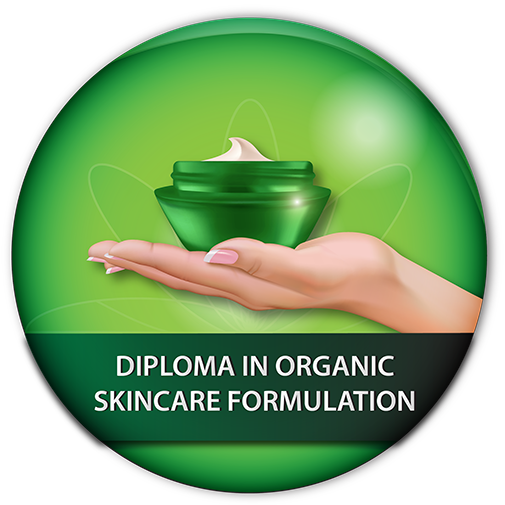
Do you want to learn how to make organic skincare that works?
Our award-winning foundational natural skincare course teaches you how to formulate organic skincare products and launch the beauty brand of your dreams. Click Here
Key ingredients for a golden lip oil
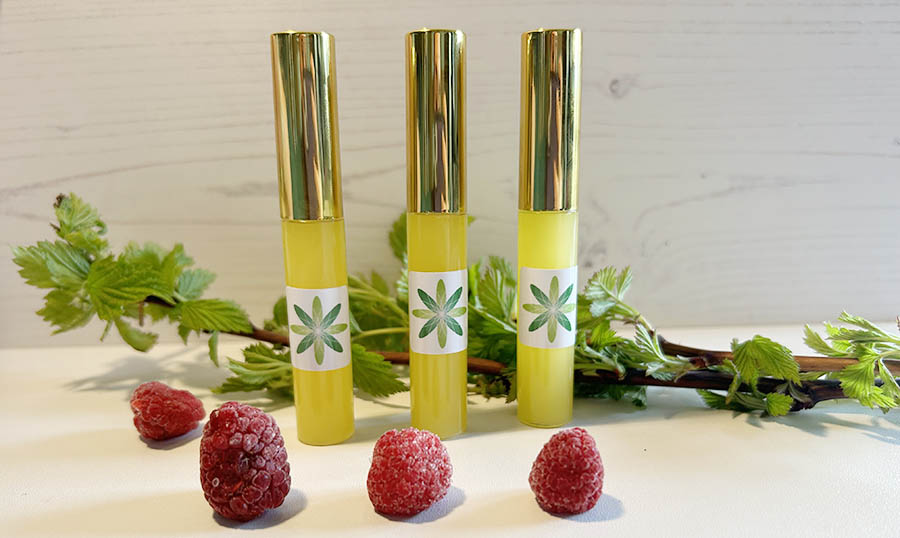
Cera bellina
INCI: Polyglycerol-3 beeswax Cera bellina is a unique ingredient that is often used in natural lip oil formulations to help improve their texture and stability. It is a modified form of beeswax in which the free fatty acids have been converted to polyglycerol esters. This produces a wax that has oil-gelling properties and creates textures that are more viscous and silky smooth than traditional beeswax and do not have a “dragging” feel on the skin. In our natural lip oil, cera bellina helps to thicken the formula and create a smooth, creamy texture that glides easily onto the lips. It also provides a protective barrier on the lips, helping to lock in moisture and prevent dryness. Unlike traditional waxes, cera bellina can help to stabilise the texture of a formula, preventing separation or graininess over time. Overall, cera bellina can be a valuable addition to natural lip oil formulations, helping to enhance their performance and provide a luxurious feel.Raspberry oil
INCI: Rubus idaeus seed oil Raspberry oil is a cold-pressed oil extracted from the seeds of the raspberry fruit. It is a very popular ingredient for upcycled beauty formulations as the seeds are waste by-products of the food industry left from the production of juices and jams. The redundant milled seeds are also used as exfoliants in skincare products. When it comes to lip care, raspberry seed oil has several benefits. For one, it is high in essential fatty acids, which can help restore the natural lipid barrier of the lips and keep them hydrated by reducing transepidermal water loss (TEWL). Additionally, raspberry oil contains ellagic acid, a powerful antioxidant that can help to protect the lips from free radical damage and may protect the lips from collagen degradation. Overall, raspberry seed oil is a highly effective ingredient for keeping your lips soft, smooth, and plump.Marula oil
INCI: Sclerocarya birrea seed oil Marula oil is a nutrient-rich oil derived from the fruit kernels of the marula tree. When it comes to lip care, marula oil has many benefits. First and foremost, it is deeply moisturising, which makes it an ideal ingredient for treating dry, cracked, or chapped lips. Additionally, marula oil is packed with antioxidants. It can help to protect the lips from environmental stressors and reduce dryness. Marula oil also contains high levels of oleic acid, which has anti-inflammatory properties and can help to soothe and calm irritated skin. Overall, marula oil is a powerful and nourishing ingredient that can help to keep your lips healthy, hydrated, and protected. You can find out more about African-origin plant oils such as marula in our article on 10 natural African skincare ingredients.Our free formula: golden marula lip oil
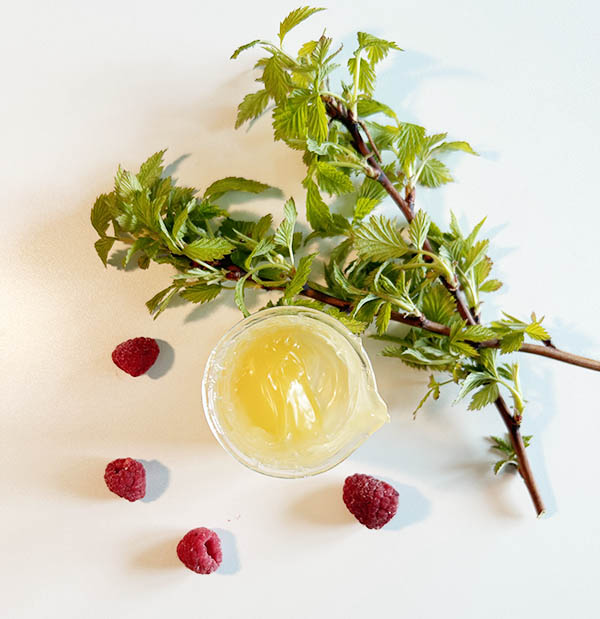 This free formula creates a viscous oil, and thanks to the cera bellina, it glides on smoothly and creates a gentle, non-sticky barrier on the lips. Try applying it to damp skin or layering on a lip serum that contains hyaluronic acid for ultimate hydration.
Makes: 50g (around 5 tubes)
Formulation: Warm process
Time taken: 15 minutes
Level: Beginner-level with customisation options
This free formula creates a viscous oil, and thanks to the cera bellina, it glides on smoothly and creates a gentle, non-sticky barrier on the lips. Try applying it to damp skin or layering on a lip serum that contains hyaluronic acid for ultimate hydration.
Makes: 50g (around 5 tubes)
Formulation: Warm process
Time taken: 15 minutes
Level: Beginner-level with customisation options
| Phase | Ingredients | INCI | Weight (g) |
| A | Castor oil | Ricinus communis seed oil | 20.00 |
| A | Golden jojoba oil | Simmondsia chinensis seed oil | 16.25 |
| A | Cera bellina wax | Polyglycerol-3 beeswax | 2.50 |
| A | Marula oil | Sclerocarya birrea seed oil | 5.00 |
| B | Raspberry seed oil | Rubus idaeus seed oil | 5.00 |
| B | Raspberry CO2 extract | Rubus idaeus seed extract, Rosmarinus officinalis leaf extract | 1.00 |
| C | Tocopherol | Tocopherol | 0.25 |
| Total: 50.00 |
- Scales
- Heated water bath and cool water bath
- Glass beakers, glass rods and some spatulas
- Thermometer
- Mini whisk
- Suitable container
Method of Manufacture
Here’s our step-by-step method to make this gorgeous natural golden lip oil:- Clean and prepare your workspace
Sanitise your utensils and work area, and wear appropriate PPE according to GMP.
-
Weigh the oils and the wax
Start by weighing out the castor oil, jojoba oil, marula oil and cera bellina wax into a glass beaker.
- Melt the oils and the wax
Place the beaker in a warm water bath with hot (but not simmering) water. The wax melts at a temperature of between 63°C – 73°C so this is the temperature you are aiming for.
- Weigh your heat-sensitive oils
While your oils are heating, weigh your raspberry oil and extract into a separate small beaker and stir.
- Stir and cool the blend
Once the wax has fully melted, remove the beaker from the water bath and give the contents a good stir. You now need to cool the blend to 40°C. We recommend using a bowl of cool (not cold) tap water to cool the blend to a trace. Keep stirring constantly to make sure it cools evenly. The liquid should be thick, but still mobile.
-
Add your heat-sensitive oils
Once the blend has cooled enough, stir in the raspberry oil blend until it combines fully. There should be no lumps or separation. If your blend has become too cold, you can briefly place the beaker back into the warm water bath on a very low heat for a few moments or until it blends together fully.
- Add vitamin E
Once everything has mixed well and the product is below 40°C, add the vitamin E and stir well.
- Package and label
Pour or use a syringe to decant the blend into lip gloss tubes. Label your lip oil with a name, date and batch number.
Formulation notes:
- Feel free to explore other oils to personalise the lip oil
- You can also add oil-soluble active ingredients to your lip oil
Learn how to formulate natural & organic skincare
I hope you enjoyed making this golden lip oil! If you’d like to learn more about making your own natural and organic skincare, why not check out our free formulation course? Learn how to create professional-grade organic skincare from the comfort of your home and discover how fun and easy it is to be a cosmetic formulator.Suggested suppliers
Many of the suppliers below ship internationally. We indicate their country or regional base. Aromazone (EU) Aromantic (UK) Alexmo Cosmetics (EU) Manske (EU) Soap Kitchen (UK) Elemental (EU) Lotioncrafter (USA) Essential Wholesale (USA) Go Native (New Zealand) Naturally Balmy (UK) O&3 – The Oil Family (UK, EU) Soap & More (Canada)Leave us a comment

Brooke Medhurst is a Tutor at Formula Botanica. Find out more about the Formula Botanica Team.

